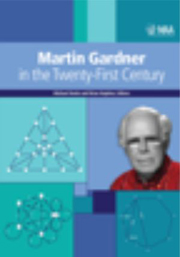Book contents
- Frontmatter
- Preface
- Contents
- I Geometry
- II Number Theory and Graph Theory
- III Flexagons and Catalan Numbers
- IV Making Things Fit
- V Further Puzzles and Games
- VI Cards and Probability
- VII Other Aspects of Martin Gardner
- 36 Against the Odds
- 37 A Modular Miracle
- 38 The Golden Ratio—A Contrary Viewpoint
- 39 Review of The Mysterious Mr. Ammann by Marjorie Senechal
- 40 Review of PopCo by Scarlett Thomas
- 41 Superstrings and Thelma
- Index
- About the Editors
36 - Against the Odds
from VII - Other Aspects of Martin Gardner
- Frontmatter
- Preface
- Contents
- I Geometry
- II Number Theory and Graph Theory
- III Flexagons and Catalan Numbers
- IV Making Things Fit
- V Further Puzzles and Games
- VI Cards and Probability
- VII Other Aspects of Martin Gardner
- 36 Against the Odds
- 37 A Modular Miracle
- 38 The Golden Ratio—A Contrary Viewpoint
- 39 Review of The Mysterious Mr. Ammann by Marjorie Senechal
- 40 Review of PopCo by Scarlett Thomas
- 41 Superstrings and Thelma
- Index
- About the Editors
Summary
Luther Washington was a friendly, shy, intelligent boy, the oldest of five children who lived with their parents in Butterfield, Kansas. He was one of sixteen African Americans who attended Butterfield Central High. His father owned a small grocery store in the town's black district. His mother cooked dinners for one of the town's bankers.
For some reason, which his parents never understood, Luther was fascinated by numbers. One day, when he was ten, he surprised his father by saying: “Dad, I've discovered an easy way to tell if a big number can be divided by four or eight and not have anything left over.”
The family was having breakfast. “Tell us about it,” said Mr. Washington.
“Well,” said Luther, “if the last two digits”—his grade school teacher had taught him to distinguish digits from numbers—“can be divided by four with nothing left over, the big number also can be divided by four. Otherwise, it can't. And if the big number's last three digits are a product of eight, so is the big number.”
“Interesting,” said Mrs. Washington. “But I can't see how that could be of any use to anybody.”
“I don't care whether it's any use or not. I just think it's neat.”
“I wish you wouldn't waste so much time on such things,” said Mr. Washington. “All the math you'll ever need in life is knowing how to add, subtract, multiply, and divide, and how to make change.”
- Type
- Chapter
- Information
- Martin Gardner in the Twenty-First Century , pp. 265 - 270Publisher: Mathematical Association of AmericaPrint publication year: 2012



